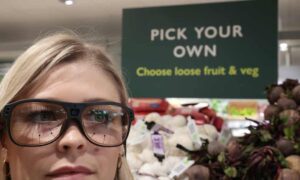
With thick black frames and hidden cameras, the glasses look designed for espionage or the metaverse but instead the eye-tracking headgear is being deployed to get inside shoppers’ heads as part of the drive to cut plastic packaging from the weekly food shop.
It is an unlikely scene. Hooked up with the glasses a shopper is being tailed around a Waitrose produce department by a researcher carrying a large tablet that displays live footage of them picking up banal things such as potatoes, apples and bananas.
While not cinematic the film clips will be analysed by experts who are looking at the in-store messages that are the most effective at getting people to switch from buying pre-packaged fruit and veg to picking and weighing their own.
The store in Thatcham, Berkshire, is being used to see if prompts such as “same quality, no packaging” and “perfectly packaged by nature” can help break a cycle that contributes to UK households throwing away nearly 100bn pieces of plastic packaging a year.
Shoppers have got used to the “convenience” of plastic packaging, says Joanna Linley of the anti-waste charity Wrap, who helped set up the trial. “Regardless of what we say, and what we know we should do, realistically when we go into a shop grabbing a bag of something is much easier and more convenient than buying something loose.”
In 2018 UK supermarkets and food companies signed up to voluntary targets to cut plastic packaging over the next seven years. The goals of the UK Plastics Pact – which is led by Wrap, whose work helps shape government policy on sustainability matters – include 30% of all fresh produce being sold loose by 2025.
However, the industry looks set to miss that target. A progress report published late last year said that in 2022 an average of 19.4% of fresh produce sales was loose, with the proportion by retailer varying from 2% to 30%.
There are compelling reasons to “choose loose”. Fresh fruit and veg is responsible for more food waste than anything else we buy, with 1.6m tonnes – nearly £4bn worth – thrown away each year. Removing the packaging should mean less plastic and food waste because households will be able to buy closer to the right amount.
But at the moment supermarkets offer primarily pre-packaged produce because that is what sells, and people buy it because that is on the shelves. In 2019 Iceland abandoned a loose produce trial after it led to a 30% drop in sales. “I certainly can’t justify investing millions in new tills and scales to offer something our customers don’t want to buy,” said its boss, Richard Walker, at the time.
